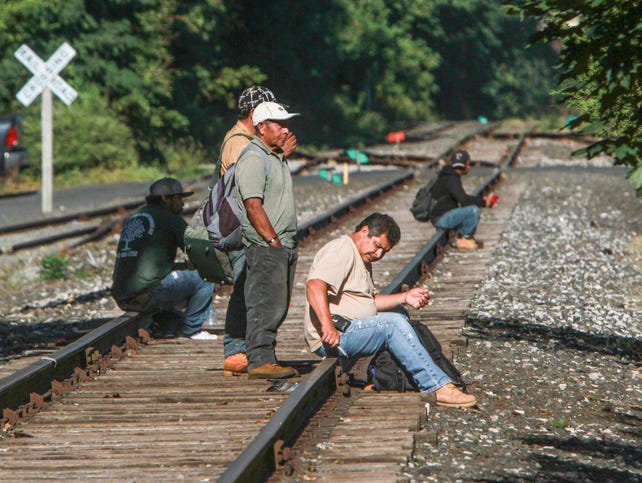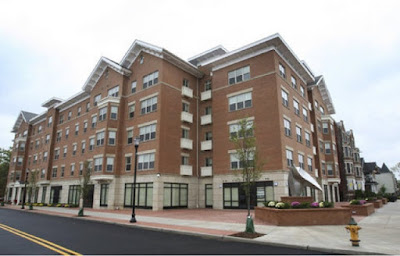THE TOWN FACES NEW GROWING PAINS OVER AN INFLUX OF LATINO IMMIGRANTS: HOW TO SOLVE SCHOOL OVERCROWDING?
Changing Faces: An ongoing series that examines how our local communities are evolving.
By Karen Yi, @karen_yi
FREEHOLD When Magdalena Romero first opened her deli here 10 years ago, she says there weren’t any places to buy ingredients like nopales, poblano peppers or squash blossoms — staples of traditional Mexican plates.
La Malinche Deli, tucked on West Main Street between a barber shop and a money-exchange store, offers a cave of comfort to those born in a country more than 2,600 miles away. Mini Mexican flags and sombreros hang overhead, handmade beaded bracelets to ward off negative energy drape one side of the store and rows of pinto beans, black beans and garbanzo beans line the opposite wall.
“These are our things, our customs,” says Romero, who migrated from Mexico in 1998. "People always search for their products, what they're used to."
Less than 500 feet down the bricked sidewalk is Federici’s Family Restaurant, a Freehold fixture and one of the oldest family-run businesses in the area.
“We’ve been in town 94 years,” said co-owner Michael Federici. Here, 65-year-old ovens still crisp pizza pies while patrons in cozy booths feast on recipes dating to the 1920s.
“That pizza has not changed,” said Jim Conover, pastor at St. Rose of Lima Parish, who grew up in Freehold. “Its taste, in all those years, is exactly the same as when I was a kid.”
In this town of 12,000 residents, long-standing traditions converge with new customs brought by waves of Hispanic immigrants. But in many ways the story of Freehold has always been one of migration.
Groups of Scottish, Irish and black migrants have all planted roots here — it was once a center for farmers to exchange goods, and a factory town dotted with retail businesses. At one point considered the downtown of western Monmouth, Freehold has since become a hub for mostly law offices and restaurants, fueled in part by Hispanic workers.
Freehold saw a large influx of Hispanic immigrants between 1990 and 2000. Eleven percent of residents were Hispanic in 1990, spiking to 28 percent in 2000. Now nearly half of this town is Hispanic, according to 2013 census data. The borough’s total population increased by 10 percent, or about 1,000 residents, since 2000.
This boom in Latino families has changed the face of Freehold, as seen in the mix of restaurants, culture and businesses. Where many New Jersey communities have struggled with population declines, Freehold continues largely to buck the trend. But the influx has also weighed on the town’s infrastructure — spurring friction around rental housing, code enforcement and, most recently, in the cash-strapped school system.
Freehold schools have become ground zero for the local immigration debate — albeit a conversation move civil than the one at the national level. The district has been overwhelmed by the influx of mostly Latino students. Voters, weary of high taxes in this working-class town, twice rejected a bond measure to alleviate crowding and say they can't solve the crisis alone.
The Latino community, despite its burgeoning numbers, has not yet amassed the political muscle to force the issue at the polls: most voting-age residents are undocumented, officials say. At public hearings this week, residents weighed in on a measure that would have the state override voters and impose a $32.9 million bond to reduce crowding.
"There's no political power with non-voting, undocumented adults," Freehold Schools Superintendent Rocco Tomazic said. "We keep getting more kids and we don't get any more (state) aid."
The battle over the schools is reminiscent of earlier growing pains.
In the early 2000s, the borough grappled with mounting complaints from longtime residents about littering, overcrowded housing, noise and other public nuisances. Many locals, uneasy with the changing culture, blamed undocumented immigrants for the problems.
Borough officials responded by focusing on "quality of life issues." They began targeting overcrowded apartments and banned loitering in certain areas — a bid to rein in hiring of day laborers. The actions met stiff opposition among immigrant groups, who sued claiming harassment and civil rights violations. Under a settlement, the borough amended its most controversial practices and rescinded others.
"It was difficult," said Mayor Nolan Higgins, who was not mayor at the time. "But things have gotten better as time has gone on."
Many more-recent arrivals second that view; they say they feel more accepted by their citizen neighbors and are invited to participate in town festivals and events. But in many ways a void remains.
"While we’re blending well it’s almost like little individual communities," said Andre McGuire, a pastor at New Beginnings Agape Christian Center for 22 years. "We’re not as cultures meeting and dealing with each other as well as we should."
No room to grow
During a preschool orientation earlier this month, parents packed the auditorium at Park Avenue Elementary waiting to see their new classrooms and meet their teachers. Instructions were read in English, then Spanish.
But instead of walking down the hallways, half the room boarded yellow school buses — their classrooms were three miles away in rented spaces the next town over.

FILE PHOTO
Students walk through Park Avenue Elementary School in Freehold.
Freehold schools have no more room to spare. The pre-k through eighth-grade district — the only one in Monmouth County to receive federal dollars for full-day preschool — rented three classrooms inside Freehold Township’s schools to accommodate pre-k students. It already rents six classrooms for kindergarteners.
Factor in the cost of transportation, rent and custodial services, and that’s $192,224 less the district has available to spend on actually educating its youngest students.
Built to house no more than 1,100 students, 1,700 are enrolled in Freehold schools this year. Of those, 72 percent are Hispanic and more than three-quarters receive free or reduced-price lunch, district officials say.
“It’s been a straight up trajectory of Hispanic students,” said Tomazic. One in four students was Hispanic in 1998. Now, it’s nearly three in four.

Tom Spader, Tom Spader/Gannett
Freehold, NJ Fourth graders in class at the Park Avenue school in Freehold. It is one of the more overcrowded schools in the district. 091615
Most of the students’ parents are undocumented and can’t vote. So when the district asked voters last year for a $32.9 million bond to build 23 additional classrooms, it failed twice. Of the 5,300 registered voters in town, just 611 cast ballots in the December referendum. The question failed, 370 to 241.
School officials say many voters have no children in school or don’t want to pay higher taxes. Others say there’s lingering resentment over the influx of immigrants. Almost half of the residents don’t speak English at home and 36 percent were foreign born.
“The bottom line is, schools are not political places, our job is to educate, our job is not to determine immigration issues, our job is to treat every kid the same,” said Ronnie Dougherty, principal at Freehold Intermediate School and a borough resident.
The district has petitioned state Education Commissioner David Hespe to overturn voters’ decision on the bond. It would be extraordinary if that happens. The education commissioner has only made two such decisions in the past, in 2003 authorizing $19.2 million in bonds for Clark Township school district in Union County and in 2008 authorizing an $800,000 bond for Milford schools in Hunterdon County.
At the Freehold Learning Center, a large plastic curtain partitions the school's gym, so up to three classes can share the room. The library functions as a computer room and a Spanish class. In the hallways, there’s barely room for children to walk between classes. Two or three kids share a locker.
In the other schools, students are crammed into makeshift classrooms.The middle school has no library. Teachers are constantly rearranging furniture to fit more desks and use the principal’s office or hallways for one-on-one instruction.
Israel Ramirez, a parent at the Early Learning Center, said his children are packed on top of each other. “There are no walls separating classrooms,” he said recently. He said his son last year complained about the noise level and couldn’t concentrate.
Supporters of the bond point to a larger problem facing the district: it is severely underfunded by the state.
In 2008, the state passed the School Funding Reform Act (SFRA) which overhauled school funding and gave more money to districts with large numbers of students who did not speak English, had special needs or were considered at-risk.
But in 2010, Gov. Chris Christie cut $1.1 billion in school aid and has held funding flat ever since — underfunding the formula and leaving districts like Freehold struggling to maintain the same level of services amid rising enrollment and student need.
Local revenues, too, are limited. The borough has no room for new development. Average residential property values were $255,000 last year, the 44th lowest in Monmouth, which has 53 municipalities. The borough’s median household income between 2009-2013 was $55,148, lower than the state average of $71,629, according to the census.
Parent Joseph Wisa said he didn’t support the bond because it cost too much, about a $278 increase for the average assessed home at $250,000.
"It was just too much money," Wisa said.
During a public hearing Thursday, Daniel Savino, 83, said he voted against the tax increase because he lives on a fixed income.
“We can't afford it. We need help,” he said. “We have to educate our children, but we also have to support our senior citizens who are striving to stay alive.”
When compared to six neighboring kindergarten through eighth-grade school districts, which all send their students to the Freehold Regional High School district, borough schools have the lowest per-pupil cost of $11,846. The Manalapan-Englishtown district has the second lowest spending at $14,188 per pupil. Colts Neck’s has the highest per-pupil cost, double that of Freehold at $22,345.
“I don’t know how we can continue this way,” said Tomazic.
Adjusting to the immigrant wave
Freehold has adjusted to change before.
Along a vacant strip of land off Throckmorton Street, day laborers wait for work, gathering around an old patio table and mismatched chairs. They write their names on a clipboard when they arrive. Workers are hired in the order of the list.
Cars and trucks periodically pull off the road, its drivers seeking strong hands to paint, tear, scrape and mow. The minimum rate at this makeshift labor lot: $15 an hour, cash.
Mostly Mexican men chat freely on a recent morning, clad in baseball caps and construction boots. Some have lived in Freehold for the last decade, others have young families. One arrived nine days ago from Guatemala.
“My first day here was terrifying, I thought immigration [agents] would come,” said Vidal Chiquito Roldan, 44, who is undocumented.

Tom Spader, Tom Spader/Gannett
Freehold, NJ Day laborers on Throckmorton & Rhea St 091615
But things have changed along this section off Throckmorton Street known as the muster zone. Police don’t bother those seeking work here and the last time immigration agents were spotted in the area was four years ago, day laborers say.
In the early 2000s, this strip across from Rhea Street, was the nucleus for a legal battle between the borough and undocumented immigrants.
Divisiveness gripped the town as long-time residents blamed littering, loitering and excessive noise on undocumented immigrants. Local borough officials cracked down, closing the muster zone, requiring absentee landlords to list each of their tenants, and ramping up code enforcement to handle rental overcrowding.

Tom Spader, Tom Spader/Gannett
Freehold, NJ Day laborers on Throckmorton & Rhea St 091615
The actions sparked a 2003 lawsuit by a coalition of immigrant rights groups which claimed the borough was systematically discriminating against Latinos. The borough denied those claims but as part of a settlement, reopened the muster zone and changed its procedures for inspecting rental homes.
Freehold became a microcosm for the national immigration debate. Elected officials at the time questioned why such a small town of less than 2-square miles should have to shoulder the burden of the immigration problem alone. Affluent towns surrounding the borough also reaped the benefits of cheap labor — undocumented workers staffed the kitchens, landscaped pristine lawns and swept offices after hours. But it was the borough that was forced to confront major shifts in its schools, housing and along streets like Throckmorton.
"Twelve years ago the doors were slammed on us almost everywhere," said Rita Dentino, who heads Casa Freehold, a nonprofit which advocates for immigrant workers. "Things are better, but I still think there’s a long way to go and right now we’re in a precarious time because of what Donald Trump is stirring up." The Republican presidential front-runner has pledged to deport illegal immigrants and end birthright citizenship for their children.
Immigrant rights groups say they haven’t received any complaints about housing inspections or harassment of day laborers lately. In 2003, the code enforcement office, which inspects rental homes, received 3,250 complaints and issued 230 summonses, 57 for overcrowded dwellings. Last year it received 700 complaints and issued 94 summonses, 83 for property maintenance.
“We’ve cut back on a lot of the overcrowding,” said Henry Stryker III, director of code enforcement. “Is it still out there? Yes. Is it running rampant like it was five and 10 years ago? No.”
Where cultures meet
Carl N. Steinberg pulls out an old map tucked deep in his antique store on Monmouth Avenue. He points to businesses sprawled across it: the Coffee Shoppe, Ballew Jewelers, Mr. Frebbles and others.
“Gone, gone, gone,” says Steinberg, 63, a realtor and local store owner. “I’ve watched them all come and go.”

Tom Spader, Tom Spader/Gannett
Freehold, NJ Carl Steinberg, former councilman, collector of antiques - 2 Monmouth Avenue 091615
Much of the retail that dotted the old downtown is no longer here, stamped out as Route 9 became a corridor for development in the 1960s and the Freehold Raceway Mall opened in 1990.
“It was ‘Leave it to Beaverville’ here,” said Steinberg, who moved out of the borough recently. He says he remembers walking down Main Street when he was a kid, clinging to his father, a local businessman.
“My father knew everybody and everybody knew who I was,” he said.
Mayor Higgins grew up in the funeral home he inherited from his family and now runs on Center Street. He remembers hearing the looms of the now-closed rug mill click back and forth a block and a half away.
Steve Goldberg, who purchased and restored the American Hotel on East Main Street in 2006, said he decided to fix the rundown hotel, originally built in 1827 as a stagecoach stop, when he "realized how important this particular place is to the history of Freehold."
Stories like these are part of the fabric of Freehold, a borough that produced Bruce Springsteen, serves as the county seat and has a long history of welcoming migrants looking for work. But so are stories like that of Andres Pinto, a Chilean immigrant, who opened a tailor shop on Main Street 28 years ago.
"Before we were like two or three guys here" that spoke Spanish, said Pinto. Now he says he’s seeing more Latinos open their own stores.The changing population has also changed his clothes-altering business. As the population of Mexicans grew, he began renting tuxedos for Quinceañeras — the coming of age party for 15-year-old Latina girls — and altering the wedding-like dresses used by debutants.
At the intersection of Route 79 and Route 537, there's a 7-foot-tall granite memorial bearing 1,385 names of men and women who served in World War II. It sits on a triangular park dovetailing with Main Street, where Spanish-speaking workers are heard in restaurant kitchens between clangs of dishes and bursts of ranchero music.
Around 5 p.m. workers spattered with paint and dust walk alongside others in suits — each making their way home.
View original story at: http://www.app.com/story/news/local/western-monmouth-county/freehold/2015/09/24/freehold-changing-faces/72061642/














